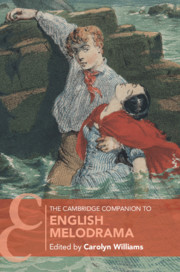Book contents
- The Cambridge Companion to English Melodrama
- The Cambridge Companion to English Melodrama
- Copyright page
- Dedication
- Contents
- Illustrations
- Contributors
- Acknowledgements
- A Note on Citations of Plays
- Chronology
- 1 Introduction
- I Histories of English Melodrama
- II Melodramatic Technique
- III Melodrama and Nineteenth-Century English Culture
- 10 Melodrama and Gender
- 11 Melodrama and Class
- 12 Melodrama and Empire
- 13 Melodrama and Race
- IV Extensions of Melodrama
- Guide to Further Reading
- Index
- Cambridge Companions to …
13 - Melodrama and Race
from III - Melodrama and Nineteenth-Century English Culture
Published online by Cambridge University Press: 06 October 2018
- The Cambridge Companion to English Melodrama
- The Cambridge Companion to English Melodrama
- Copyright page
- Dedication
- Contents
- Illustrations
- Contributors
- Acknowledgements
- A Note on Citations of Plays
- Chronology
- 1 Introduction
- I Histories of English Melodrama
- II Melodramatic Technique
- III Melodrama and Nineteenth-Century English Culture
- 10 Melodrama and Gender
- 11 Melodrama and Class
- 12 Melodrama and Empire
- 13 Melodrama and Race
- IV Extensions of Melodrama
- Guide to Further Reading
- Index
- Cambridge Companions to …
Summary
- Type
- Chapter
- Information
- The Cambridge Companion to English Melodrama , pp. 192 - 206Publisher: Cambridge University PressPrint publication year: 2018

